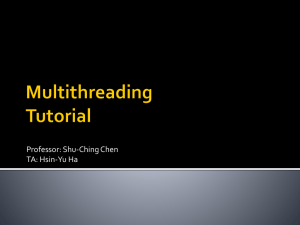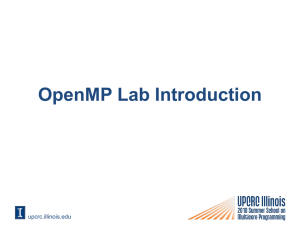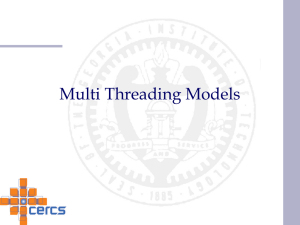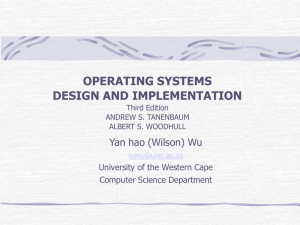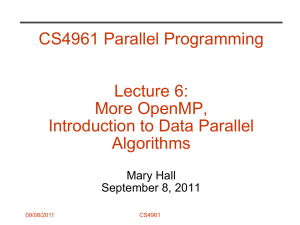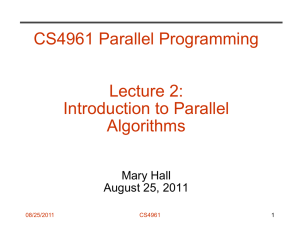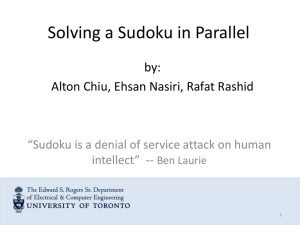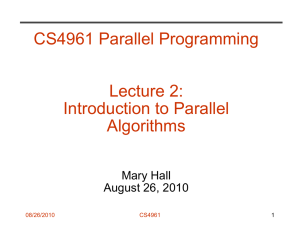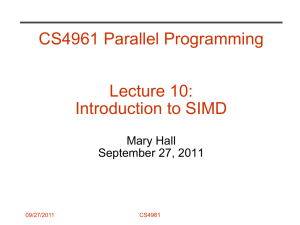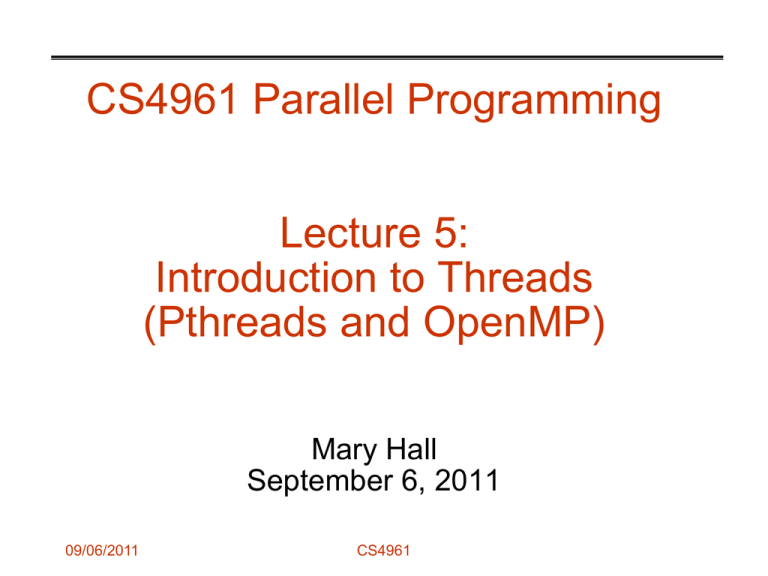
CS4961 Parallel Programming
Lecture 5:
Introduction to Threads
(Pthreads and OpenMP)
Mary Hall
September 6, 2011
09/06/2011
CS4961
Homework 2: Due Before Class, Thursday, Sept. 8
‘handin cs4961 hw2 <file>’
Problem 1: (Coherence) #2.15 in textbook
(a)Suppose a shared-memory system uses snooping
cache coherence and write-back caches. Also
suppose that core 0 has the variable x in its cache,
and it executes the assignment x=5. Finally, suppose
that core 1 doesn’t have x in its cache, and after core
0’s update to x, core 1 tries to execute y=x. What
value will be assigned to y? Why?
(b) Suppose that the shared-memory system in the
previous part uses a directory-based protocol. What
value will be assigned to y? Why?
(c)Can you suggest how any problems you found in the
first two parts might be solved?
09/01/2011
CS4961
2
Homework 2, cont.
Problem 2: (Bisection width/bandwidth)
(a) What is the bisection width and bisection
bandwidth of a 3-d toroidal mesh.
(b) A planar mesh is just like a toroidal mesh, except
that it doesn’t have the wraparound links. What is
the bisection width and bisection bandwidth of a
square planar mesh.
Problem 3 (in general, not specific to any algorithm):
How is algorithm selection impacted by the value of
λ?
09/01/2011
CS4961
3
Homework 2, cont.
Problem 4: (λ concept) #2.10 in textbook
Suppose a program must execute 1012 instructions in order to solve
a particular problem. Suppose further that a single processor
system can solve the problem in 106 seconds (about 11.6 days).
So, on average, the single processor system executes 106 or a
million instructions per second. Now suppose that the program
has been parallelized for execution on a distributed-memory
system. Suppose also that if the parallel program uses p
processors, each processor will execute 1012/p instructions, and
each processor must send 109 (p-1) messages. Finally, suppose
that there is no additional overhead in executing the parallel
program. That is, the program will complete after each processor
has executed all of its instructions and sent all its messages, and
there won’t be any delays due to things such as waiting for
messages.
(a)Suppose it takes 10-9 seconds to send a message. How long will
it take the program to run with 1000 processors, if each
processor is as fast as the single processor on which the serial
program was run?
(b)Suppose it takes 10-3 seconds to send a message. How long will
it take the program to run with 1000 processors?
09/01/2011
CS4961
4
Reading for Today
• Chapter 2.4-2.4.3 (pgs. 47-52)
2.4 Parallel Software
• Caveats
• Coordinating the processes/threads
• Shared-memory
• Chapter 4.1-4.2 (pgs. 151-159)
4.0 Shared Memory Programming with Pthreads
• Processes, Threads, and Pthreads
• Hello, World in Pthreads
• Chapter 5.1 (pgs. 209-215)
5.0 Shared Memory Programming with OpenMP
• Getting Started
09/06/2011
CS4961
Today’s Lecture
• Review Shared Memory and Distributed Memory
Programming Models
• Brief Overview of POSIX Threads (Pthreads)
• Data Parallelism in OpenMP
-
Expressing Parallel Loops
Parallel Regions (SPMD)
Scheduling Loops
Synchronization
• Sources of material:
- Textbook
- Jim Demmel and Kathy Yelick, UCB
- openmp.org
09/06/2011
CS4961
Shared Memory vs. Distributed Memory Programs
• Shared Memory Programming
-
Start a single process and fork threads.
Threads carry out work.
Threads communicate through shared memory.
Threads coordinate through synchronization (also through
shared memory).
• Distributed Memory Programming
-
Start multiple processes on multiple systems.
Processes carry out work.
Processes communicate through message-passing.
Processes coordinate either through message-passing or
synchronization (generates messages).
09/06/2011
CS4961
Review: Predominant Parallel Control Mechanisms
09/06/2011
CS4961
Shared Memory
• Dynamic threads
- Master thread waits for work, forks new threads, and when
threads are done, they terminate
- Efficient use of resources, but thread creation and
termination is time consuming.
• Static threads
- Pool of threads created and are allocated work, but do not
terminate until cleanup.
- Better performance, but potential waste of system resources.
Copyright © 2010, Elsevier Inc. All rights Reserved
Thread Safety
• Chapter 2 mentions thread safety of shared-memory
parallel functions or libraries.
- A function or library is thread-safe if it operates
“correctly” when called by multiple, simultaneously executing
threads.
- Since multiple threads communicate and coordinate through
shared memory, a thread-safe code modifies the state of
shared memory using appropriate synchronization.
- Some features of sequential code that may not be thread
safe?
09/06/2011
CS4961
Programming with Threads
Several thread libraries, more being created
• PThreads is the POSIX Standard
- Relatively low level
- Programmer expresses thread management and
coordination
- Programmer decomposes parallelism and manages schedule
- Portable but possibly slow
- Most widely used for systems-oriented code, and also used
for some kinds of application code
• OpenMP is newer standard
- Higher-level support for scientific programming on shared
memory architectures
- Programmer identifies parallelism and data properties, and
guides scheduling at a high level
- System decomposes parallelism and manages schedule
- Arose from a variety of architecture-specific pragmas
09/06/201
CS4961
Overview of POSIX Threads (Pthreads)
• POSIX: Portable Operating System Interface for
UNIX
- Interface to Operating System utilities
• PThreads: The POSIX threading interface
- System calls to create and synchronize threads
- Should be relatively uniform across UNIX-like OS
platforms
• PThreads contain support for
- Creating parallelism
- Synchronizing
- No explicit support for communication, because shared
memory is implicit; a pointer to shared data is passed to a
thread
Slide source: Jim Demmel and Kathy Yelick
09/06/2011
CS4961
Forking Pthreads
Signature:
int pthread_create(pthread_t *,
const pthread_attr_t *,
void * (*)(void *),
void *);
Example call:
errcode = pthread_create(&thread_id,
&thread_attribute,
&thread_fun, &fun_arg);
• thread_id is the thread id or handle (used to halt, etc.)
• thread_attribute various attributes
- standard default values obtained by passing a NULL pointer
• thread_fun the function to be run (takes and returns void*)
• fun_arg an argument can be passed to thread_fun when it starts
• errorcode will be set to nonzero if the create operation fails
Slide source: Jim Demmel and Kathy Yelick
09/06/2011
CS4961
Forking Pthreads, cont.
• The effect of pthread_create
- Master thread actually causes the operating system to
create a new thread
- Each thread executes a specific function, thread_fun
- The same thread function is executed by all threads that are
created, representing the thread’s computation decomposition
- For the program to perform different work in different
threads, the arguments passed at thread creation
distinguish the thread’s “id” and any other unique features
of the thread.
09/06/2011
CS4961
Simple Threading Example
int main() {
Compile using gcc … –lpthread
pthread_t threads[16];
int tn;
for(tn=0; tn<16; tn++) {
pthread_create(&threads[tn], NULL, ParFun, NULL);
}
for(tn=0; tn<16 ; tn++) {
pthread_join(threads[tn], NULL);
}
return 0;
}
This code creates 16 threads that execute the function “ParFun”.
Note that thread creation is costly, so it is important that ParFun do a lot of work
in parallel to amortize this cost.
Slide source: Jim Demmel and Kathy Yelick
09/06/2011
CS4961
Shared Data and Threads
• Variables declared outside of main are shared
• Object allocated on the heap may be shared (if
pointer is passed)
• Variables on the stack are private: passing pointer to
these around to other threads can cause problems
• Shared data often a result of creating a large
“thread data” struct
- Passed into all threads as argument
- Simple example:
char *message = "Hello World!\n";
pthread_create( &thread1,
NULL,
(void*)&print_fun,
(void*) message);
Slide source: Jim Demmel and Kathy Yelick
09/06/2011
CS4961
“Hello World” in Pthreads
• Some preliminaries
- Number of threads to create (threadcount) is set at
runtime and read from command line
- Each thread prints “Hello from thread <X> of <threadcount>”
• Also need another function
- int pthread_join(pthread_t *, void **value_ptr)
- From Unix specification: “suspends execution of the calling
thread until the target thread terminates, unless the target
thread has already terminated.”
- The second parameter allows the exiting thread to pass
information back to the calling thread (often NULL).
- Returns nonzero if there is an error
09/06/2011
CS4961
Hello World! (1)
declares the various Pthreads
functions, constants, types, etc.
Copyright © 2010, Elsevier Inc. All rights Reserved
Hello World! (2)
Copyright © 2010, Elsevier Inc. All rights Reserved
Hello World! (3)
Copyright © 2010, Elsevier Inc. All rights Reserved
Explicit Synchronization:
Creating and Initializing a Barrier
• To (dynamically) initialize a barrier, use code similar
to this (which sets the number of threads to 3):
pthread_barrier_t b;
pthread_barrier_init(&b,NULL,3);
• The second argument specifies an object attribute;
using NULL yields the default attributes.
• To wait at a barrier, a process executes:
pthread_barrier_wait(&b);
• This barrier could have been statically initialized by
assigning an initial value created using the macro
PTHREAD_BARRIER_INITIALIZER(3).
Slide source: Jim Demmel and Kathy Yelick
09/06/2011
CS4961
Mutexes (aka Locks) in Pthreads
• To create a mutex:
#include <pthread.h>
pthread_mutex_t amutex = PTHREAD_MUTEX_INITIALIZER;
pthread_mutex_init(&amutex, NULL);
• To use it:
int pthread_mutex_lock(amutex);
int pthread_mutex_unlock(amutex);
• To deallocate a mutex
int pthread_mutex_destroy(pthread_mutex_t *mutex);
• Multiple mutexes may be held, but can lead to deadlock:
thread1
lock(a)
lock(b)
thread2
lock(b)
lock(a)
Slide source: Jim Demmel and Kathy Yelick
09/06/2011
CS4961
Additional Pthreads synchronization
described in textbook
• Semaphores
• Condition variables
• More discussion to come later in the semester, but
these details are not needed to get started
programming
09/06/2011
CS4961
Summary of Programming with Threads
• Pthreads are based on OS features
- Can be used from multiple languages (need appropriate header)
- Familiar language for most programmers
- Ability to shared data is convenient
• Pitfalls
- Data races are difficult to find because they can be
intermittent
- Deadlocks are usually easier, but can also be intermittent
• OpenMP is commonly used today as a simpler
alternative, but it is more restrictive
- OpenMP can parallelize many serial programs with relatively
few annotations that specify parallelism and independence
09/06/2011
CS4961
OpenMP:
Prevailing Shared Memory Programming Approach
• Model for shared-memory parallel programming
• Portable across shared-memory architectures
• Scalable (on shared-memory platforms)
• Incremental parallelization
- Parallelize individual computations in a program while leaving
the rest of the program sequential
• Compiler based
- Compiler generates thread program and synchronization
• Extensions to existing programming languages
(Fortran, C and C++)
- mainly by directives
- a few library routines
See http://www.openmp.org
09/06/2011
CS4961
A Programmer’s View of OpenMP
• OpenMP is a portable, threaded, shared-memory
programming specification with “light” syntax
- Exact behavior depends on OpenMP implementation!
- Requires compiler support (C/C++ or Fortran)
• OpenMP will:
- Allow a programmer to separate a program into serial regions
and parallel regions, rather than concurrently-executing
threads.
- Hide stack management
- Provide synchronization constructs
• OpenMP will not:
- Parallelize automatically
- Guarantee speedup
- Provide freedom from data races
09/06/2011
CS4961
OpenMP Execution Model
• Fork-join model of parallel execution
• Begin execution as a single process (master thread)
• Start of a parallel construct:
- Master thread creates team of threads (worker threads)
• Completion of a parallel construct:
- Threads in the team synchronize -- implicit barrier
• Only master thread continues execution
• Implementation optimization:
- Worker threads spin waiting on next fork
join
09/06/2011
CS4961
fork
OpenMP uses Pragmas
• Pragmas are special preprocessor instructions.
• Typically added to a system to allow behaviors that
aren’t part of the basic C specification.
• Compilers that don’t support the pragmas ignore them.
• The interpretation of OpenMP pragmas
- They modify the statement immediately following the pragma
- This could be a compound statement such as a loop
#pragma omp …
Programming Model – Data Sharing
• Parallel programs often employ
two types of data
- Shared data, visible to all
threads, similarly named
- Private data, visible to a single
thread (often stack-allocated)
// shared, globals
int bigdata[1024];
void* foo(void* bar) {
intprivate,
tid;
//
stack
• PThreads:
int tid;
• Global-scoped variables are
shared
• Stack-allocated variables are
private
• OpenMP:
•
•
•
•
shared variables are shared
private variables are private
Default is shared
Loop index is private
#pragma omp parallel \
shared
( bigdata
) \
/*
Calculation
goes
private
( tid )
here */
} {
/* Calc. here */
}
}
OpenMP directive format C
(also Fortran and C++ bindings)
• Pragmas, format
#pragma omp directive_name [ clause [ clause ] ... ] newline
• Conditional compilation
#ifdef _OPENMP
block,
e.g., printf(“%d avail.processors\n”,omp_get_num_procs());
#endif
• Case sensitive
• Include file for library routines
#ifdef _OPENMP
#include <omp.h>
#endif
09/06/2011
CS4961
OpenMP runtime library, Query Functions
omp_get_num_threads:
Returns the number of threads currently in the team executing the
parallel region from which it is called
int omp_get_num_threads(void);
omp_get_thread_num:
Returns the thread number, within the team, that lies between 0 and
omp_get_num_threads()-1, inclusive. The master thread of the
team is thread 0
int omp_get_thread_num(void);
09/06/2011
CS4961
OpenMP parallel region construct
• Block of code to be executed by multiple threads in
parallel
• Each thread executes the same code redundantly
(SPMD)
- Work within work-sharing constructs is distributed among
the threads in a team
• Example with C/C++ syntax
#pragma omp parallel [ clause [ clause ] ... ] new-line
structured-block
• clause can include the following:
private (list)
shared (list)
09/06/2011
CS4961
Hello World in OpenMP
• Let’s start with a parallel region construct
• Things to think about
- As before, number of threads is read from command line
- Code should be correct without the pragmas and library
calls
• Differences from Pthreads
- More of the required code is managed by the compiler and
runtime (so shorter)
- There is an implicit thread identifier
gcc −fopenmp …
09/06/2011
CS4961
Copyright © 2010, Elsevier Inc. All rights Reserved
In case the compiler doesn’t support OpenMP
# include <omp.h>
#ifdef _OPENMP
# include <omp.h>
#endif
Copyright © 2010, Elsevier Inc. All rights Reserved
In case the compiler doesn’t support OpenMP
# ifdef _OPENMP
int my_rank = omp_get_thread_num ( );
int thread_count = omp_get_num_threads ( );
#else
int my_rank = 0;
int thread_count = 1;
# endif
Copyright © 2010, Elsevier Inc. All rights Reserved
OpenMP Data Parallel Construct: Parallel Loop
• All pragmas begin: #pragma
• Compiler calculates loop bounds for each thread
directly from serial source (computation decomposition)
• Compiler also manages data partitioning of Res
• Synchronization also automatic (barrier)
09/06/2011
CS4961
Summary of Lecture
• OpenMP, data-parallel constructs only
- Task-parallel constructs later
• What’s good?
- Small changes are required to produce a parallel program from
sequential (parallel formulation)
- Avoid having to express low-level mapping details
- Portable and scalable, correct on 1 processor
• What is missing?
- Not completely natural if want to write a parallel code from
scratch
- Not always possible to express certain common parallel
constructs
- Locality management
- Control of performance
09/06/2011
CS4961

